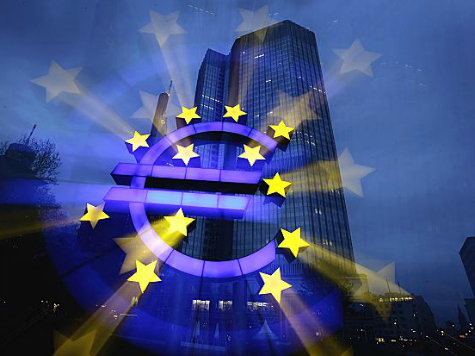
Margaret Thatcher famously commented on the European welfare state spending, “The problem with socialism is that eventually you run out of other people’s money” to spend.
European elites are panicking over a report in the Financial Times of London titled “Data Deepen Eurozone Deflation Fears.” With government spending at 50% of the gross domestic product, the 28 countries of the European Union have pursued economic policies that generate inflation to spike tax collections by pushing their citizens into higher progressive tax brackets. Having stifled economic growth and used inflation to tax away prosperity, European elites should panic.
Both Europe and America cranked up government spending and intrusion into their private sector economies to supposedly cushion the Great Recession’s misery and stimulate growth. Both modestly increased unemployment and welfare payments to individuals. However, whereas most of the European stimulus cash simply expanded government ministries, in the U.S. the money was contracted out to the private sector.
Over the last five years, American public pressure against the rise of the national debt has caused spending restraints and a government shutdown. Independent, new-stream media sources like Breitbart helped the public effectively focus pressure on Congress and the White House. Consequently, the share of expenditures by federal, state, and local government dropped 6% in America since 2009, from 43.1% of gross domestic product (GDP) to 37.2% today. With spending shrinking, America has achieved about 2.2% a year in economic growth.
In Europe the media is generally owned by the government and acts as a cheerleader to expand government’s reach. Consequently, there was no effective public pressure for spending restraints. After a big spike up to 51.3% in 2009, spending in the EU as a percentage of GDP fell slightly to 49.3% in 2012. The spending would have been higher, but the EU has grown at only 0.5% over the last five years.
Funding for public media in EU countries varies from $30 to $134 per person per year, versus less than $4 in the U.S. France Télévisions is funded by revenue from television license fees which are collected as local taxes. In the Czech Republic, public broadcasting is financed by fees collected from households and businesses for each radio or television they own. In Belgium there are actually two national public broadcasting organizations: one for Dutch-speaking Flanders and one for French-speaking Wallonia. Additionally, the Belgian and French governments provide newspaper subsidies in order to foster a “diversity of opinions” in print media.
French President François Hollande, former First Secretary of the French Socialist Party, has been the leading EU advocate for larger state revenues. Although he intends to raise top income tax rates from 40% to 75%, under his administration French journalists retain their wildly lucrative 30% income tax deduction for “professional expense.”
Media in the U.S. was created as a commercial enterprise, whereas broadcast media in Europe was built as a “public service network.” With government ministries in each EU country picking media management and funding reporter salaries, the only diversity in “public pressure” that European governments are looking for is multiple media coverage of interest groups fighting to raise taxes and expand government spending.
Stimulus spending might have helped both the U.S. and EU economies recover in 2009-2010. However, as U.S. government spending fell back, its economy continued to grow. While U.S. federal spending shrank as a percentage of GDP by about 1% during October, November, and December of last year, the private sector grew America’s GDP by a strong 2.6%.
The Financial Times quoted numerous European bankers bemoaning “the spectre of a damaging period of deflation” and demanding that the European Central Bank (ECB) start inflating the euro by printing money to buy the bonds of insolvent nations such as Spain and Portugal. The vast majority of both American and EU citizens hate inflation because it impoverishes the people as the costs of food, energy, housing, and taxes rise faster than their personal incomes.
There is no mention in the FT article about adopting the type of policies that would benefit the average European by stimulating industrial production to reduce unemployment. Failure to cut spending caused the EU plunge back into recession from 2011-2012 and appears to be about to cause a third recession in six years. Having run out of other people’s money to spend, elites are demanding the European Central Bank print more money to protect the European welfare state from itself.
The author welcomes feedback @ chriss@chrissstreetandcompany.com. Chriss Street is teaching microeconomics at University of California, Irvine this spring from March 31 – June 8, 2014. Call Student Services at (949) 824-5414 or visit http://unex.uci.edu/courses to enroll!

COMMENTS
Please let us know if you're having issues with commenting.